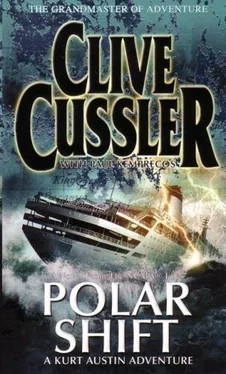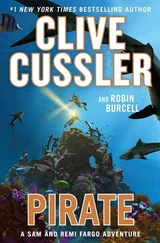Austin hung up, finished his coffee and was about to return to his cabin when Karla came into the mess hall. She seemed as surprised to see him as he was to see her. He beckoned her to his table.
She sat down and said, "I couldn't sleep."
"I can understand that. You've been through a lot in the last few days."
"Uncle Karl said that the men who murdered the expedition were after me. Something about a secret I supposedly know. I don't know what's going on, but I feel responsible for much of what has happened."
"It's not your fault. They think the secret was passed down from your grandfather, an electrical engineer named Lazlo Kovacs."
"You're mistaken. My grandfather's name was Janos, like mine."
Austin shook his head. "That was the name Kovacs assumed after he escaped from Germany at the end of World War Two."
"I don't understand."
"Your grandfather was being forced to work for the Nazis on electromagnetic weapons. He escaped from a secret lab shortly before the Russians overran East Prussia. He was apparently helped by a young member of the German resistance. The German's name was Karl."
"Uncle Karl! I always wondered what his connection was to my grandfather. They seemed so different yet so bound together."
"Now you know."
"This is insane! My grandfather never gave me any secret formula for a death ray or whatever it is they're looking for."
"You may know more than you know. Your paper on the extinction of the woolly mammoth hinted at deeper knowledge of his work."
"After the discovery of those creatures on the island, my paper is a joke. I can't wait to get back there to do some research."
"Petrov has vowed to work through academic rather than governmental circles to protect your furry friends. He's had some political trouble, and he thinks this will help his cause."
"I'm glad to hear that. But getting back to my grandfather, I went to him when I was in college with my theory of a cataclysmic extinction because he was the only scientist I knew. There was skepticism about a polar shift being possible. He said that it could happen, and had happened. That it could be caused by natural phenomena, or man-made, in the future, when the technology became available. He showed me some equations having to do with electromagnetism that he said proved his point. That's all. Later, when I was working on my thesis after his death, I incorporated his work into the paper."
"That's all he said on the subject?"
"Yes. We never really talked much about science. When my parents died, he became a father and mother to me. I remember him making up bedtime poems to get me to sleep." She sipped her coffee. "How did you and Joe happen to come to our rescue?"
"I heard from a reliable source that your life might be in danger because of your family connection."
"You rushed all the way from the other side of the world for that?"
"If I had known Uncle Karl had the situation pretty much in hand, I wouldn't have worried as much."
"Uncle Karl saved my life, but I'm afraid we were both on our last legs when you and Joe dropped down out of the sky. I'm puzzled. I thought NUMA studies the oceans."
"That's exactly why I'm here. There have been some strange disturbances in the sea that could have something to do with something your grandfather published. It was a set of equations called the Kovacs Theorems."
"I don't understand."
"You said Lazlo Kovacs theorized that electromagnetic transmissions could be used to trigger a polar shift. In the future."
"Yes, that's right."
"Well, the future is now."
"Who would want to do something like that? And why?"
Austin spread his hands. "I'm not sure. When we get back to Washington, I have someone Id like you to talk to. Maybe you can sort things out."
"I was hoping to stop in Fairbanks first."
"I'm afraid there isn't time for that. There may be a great deal at stake here."
"I understand. Even if I'm not responsible for what is going on, my family has had a hand in it, according to what you've told me. I'll do everything I can to set things right."
"I knew you'd say that. We'll make landfall tomorrow. A NUMA plane will take us back to Washington. My colleagues Gamay and Paul Trout have a town house in Georgetown, and I'm sure they'd be very happy to put you up. NUMA will foot the bill for any clothes you need."
Karla did an unexpected thing. She leaned across the table and kissed Austin lightly on the lips. "Thank you for all you've done for me and for Uncle Karl. I don't know how I can repay you."
Austin would normally have responded to an opening from a beautiful and intelligent woman like Karla with an invitation to dinner. But the move so surprised him that the best he could manage was a polite "You're welcome" and a suggestion that they get some sleep.
Karla told him that she wanted to stay up a few minutes longer, and that she'd see him in the morning. They shook hands and said good-night. As he left the mess hall, Austin looked back. Karla was resting her chin on her hands, apparently deep in thought. For all his philosophical reading, Austin was at a loss when it came to the working of fate. The gods must be laughing themselves to tears at their latest practical joke. They had locked the secret that could save the world in the finely sculpted head of a lovely young woman.
Gant considered the final moments of the foxhunt as the most sublime. The riotous red jackets, the horn blowing, the raucous tallyhos and the thundering hooves were merely a prelude to the moment of the truth that came when the baying hounds caught the terrified animal and tore it to bloody shreds.
The prey had been unusually resourceful. The wily animal splashed up a stream, ran along the top of a fallen tree and doubled back in an attempt to throw off its pursuers. But, in the end, the pack cornered the doomed animal against a thick privet hedge Gant had had planted to funnel hunted foxes to a dead end against a stone wall. Even then, the fox had attempted to defend itself before being ripped to pieces.
Gant had sent the other hunters back to his house to celebrate the satisfying conclusion. He dismounted near the hedge, and relived the fox's final moments. The hunt was a savage practice, but he considered it a metaphor for what life was all about. The life-and-death struggle between the strong and the weak.
A horse whinnied. Gant looked up at a low hill and he scowled. A horseman was silhouetted against the blue sky. No one was supposed to be riding in his fields and meadows except the foxhunters. He remounted, dug his heels in and galloped up the hill.
The man watched Gant's approach from the saddle of a chestnut-colored Arabian. Unlike the red-jacketed foxhunters, he was dressed simply in faded jeans and turquoise polo shirt. A black baseball cap with a Harley-Davidson emblem on the crown covered his platinum-silver hair.
Gant brought his mount to a wheeling stop. "You're trespassing," he snapped. "This is private property."
The man appeared unruffled, and his light blue eyes barely flickered.
"Do tell," he said.
"I could have you arrested for breaking the law," Gant said, upping the ante.
The man's lips parted in a humorless smile. "And I could have you arrested for foxhunting. Even the Brits have banned it."
Gant wasn't used to being challenged. He stood in his stirrups. "I own more than two hundred acres of land and every living thing on it. I'll do whatever I want to do with my property." His hand went to a portable radio clipped to his jacket. "Will you leave on your own or do I have to call my security people?"
"No need to call in the cavalry. I know the way out. The animal rights people won't be happy when they hear that you've had your mutts chewing up the local wildlife."
Читать дальше












